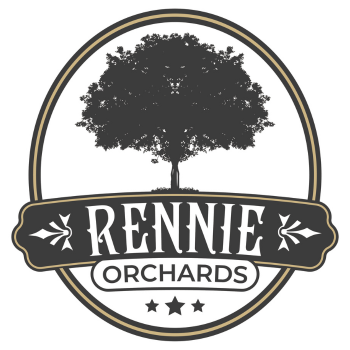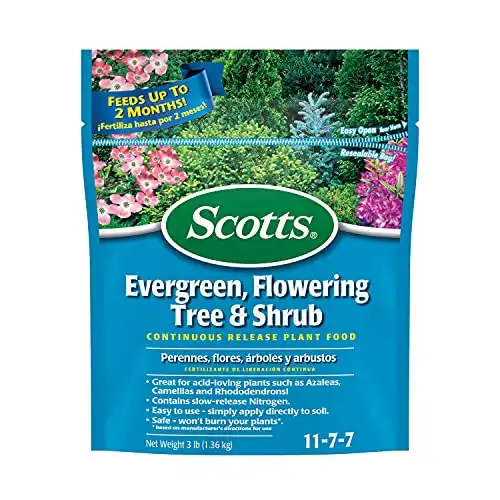Many gardeners choose dogwood trees for their gardens because of their exquisite spring flowers and gorgeous autumn leaves.
However, to keep these trees healthy and looking their best, it’s important to provide them with the right nutrients. This is where fertilizers come in.
Dogwood trees require a balanced supply of nutrients, including nitrogen, phosphorus, and potassium. Slow-release granular fertilizers or fertilizer spikes specifically designed for trees and shrubs are often a good choice. Organic options, such as compost or well-rotted manure, can also be beneficial.
The world of fertilizers can be confusing, but you’ll find everything you need to know below.
This guide will walk you through the process step by step, providing you with the knowledge and confidence you need to keep your dogwood trees healthy and thriving.
Key Takeaways
- Dogwood trees require a balanced supply of nitrogen, phosphorus, and potassium. Slow-release granular fertilizer or fertilizer spikes work well.
- Understanding the signs of nutrient deficiencies can help guide your fertilization practices. A soil test can provide valuable information about the existing nutrient levels in your soil.
- The best time to fertilize dogwood trees is in early spring, just before new growth begins.
- Top recommendations include Miracle-Gro Shake ‘N Feed for Flowering Trees and Shrubs, Jobe’s Fertilizer Spikes for Tree & Shrubs, and Espoma Organic Holly-Tone.
The key to healthy dogwood trees is proper year-round care. I explain it all in my comprehensive article, Dogwood Care and Maintenance.
Understanding the Nutrient Needs of Dogwoods
Like all plants, dogwood trees require certain nutrients to grow and thrive. Understanding these nutrient needs is the first step in providing your trees with the right fertilizer.
Key Nutrients Required for Dogwoods
Dogwood trees require a range of nutrients for healthy growth. These include macronutrients, such as nitrogen (N), phosphorus (P), and potassium (K), which are needed in large quantities.
Nitrogen promotes healthy leaf growth, phosphorus is important for root development and flowering, and potassium helps with overall plant health and disease resistance.
Signs of Nutrient Deficiencies in Dogwoods
Nutrient deficiencies can lead to a range of symptoms in dogwood trees, including:
- Yellowing leaves (a sign of nitrogen deficiency).
- Poor root development and reduced flowering (a sign of phosphorus deficiency).
- Weak growth and increased susceptibility to disease (a sign of potassium deficiency).
If you notice any of these symptoms, it may indicate that your tree is lacking in certain nutrients.
The Importance of Soil Testing
Before applying any fertilizer, it’s a good idea to conduct a soil test. This can help you determine the existing nutrient levels in your soil and identify any deficiencies.
With this information, you can choose a fertilizer that will provide the nutrients your dogwood trees need most.
Choosing the Right Fertilizer for Dogwoods
With so many different types of fertilizers available, choosing the right one for your dogwood trees can seem overwhelming, but by understanding the different types of fertilizers and what to look for on the label, you can make an informed decision.
Different Types of Fertilizers Available
There are several different types of fertilizers available for dogwood trees. These include granular fertilizers, slow-release fertilizers, and fertilizer spikes.
Granular fertilizers are sprinkled on the soil surface and watered in. They are available in fast- and slow-release forms.
Fertilizer spikes are pounded into the ground under the tree canopy and release nutrients over time, providing a steady supply of nutrients.
Understanding Fertilizer Labels and Nutrient Ratios
Fertilizer labels provide important information about the nutrient content of the fertilizer.
The three numbers on the label represent the percentages of nitrogen, phosphorus, and potassium, in that order.
For example, a fertilizer with a ratio of 10-10-10 contains 10% nitrogen, 10% phosphorus, and 10% potassium.
What To Look For
When choosing a fertilizer for your dogwood trees, look for one that provides a balanced supply of nutrients.
A slow-release fertilizer or fertilizer spikes specifically designed for trees and shrubs can be a good choice.
If your soil test indicates a deficiency in a specific nutrient, choose a fertilizer that provides that nutrient.
Best Fertilizers for Dogwoods
There are many great fertilizers available for dogwood trees. Here are a few of our top recommendations:
Miracle-Gro Shake ‘N Feed for Flowering Trees and Shrubs
This slow-release granular fertilizer is easy to apply and provides a balanced supply of nutrients. It also contains added iron to help prevent leaf yellowing.
Jobe’s Fertilizer Spikes for Tree & Shrubs
These convenient spikes provide a slow release of nutrients directly to the root zone, promoting healthy growth and beautiful blossoms.
Scotts Evergreen Flowering Tree & Shrub Continuous Release
This granular fertilizer is designed to promote vibrant flowers and lush foliage. It provides a continuous release of nutrients for up to 2 months.
Miracle-Gro Tree & Shrub Plant Food Spikes
These easy-to-use spikes provide a season-long supply of nutrients. They are designed to promote vibrant color and lush foliage.
Espoma Organic Holly-Tone
This organic fertilizer is specially formulated for acid-loving plants like dogwood. It provides a slow release of nutrients and helps to improve soil health.
When and How To Fertilize Dogwoods
The best time to fertilize dogwood trees is in late winter or early spring, just before new growth begins. This gives the tree a boost of nutrients to support its spring growth.
To apply granular fertilizer, sprinkle it on the soil surface under the tree, extending out to the drip line (the outer edge of the tree’s canopy). Then water thoroughly to help the fertilizer move into the soil.
For fertilizer spikes, simply push them into the ground around the tree’s drip line, following the package instructions.
Organic Fertilizer Options for Dogwoods
If you prefer to use organic fertilizers, there are several options available. Compost and well-rotted manure are excellent sources of nutrients and can be added to the soil around your dogwood trees.
There are also many organic commercial fertilizers available, such as Espoma Organic Holly-Tone, which is specially formulated for acid-loving plants like dogwood.
Related Questions:
Do Coffee Grounds Help Dogwood Trees?
Coffee grounds can be beneficial for dogwood trees. They are rich in nitrogen, a nutrient that promotes healthy leaf growth.
Additionally, coffee grounds can help to acidify the soil, which is beneficial for dogwood trees. Simply sprinkle used coffee grounds on the soil surface under the tree, and water thoroughly.
What Month Do You Fertilize Dogwood Trees?
The best time of year to fertilize dogwood trees is typically in early spring, right before new growth appears. However, the exact timing can depend on your local climate.
In warmer regions, you might fertilize as early as late winter, while in cooler regions, you might wait until late spring.
Final Thoughts
Fertilizing your dogwood trees is an important part of their care. By understanding their nutrient needs, choosing the right fertilizer, and applying it properly, you can help your dogwood trees thrive.
Just remember not to overdo it when it comes to fertilizer as you could wind up doing more harm than good.
Want to learn more about caring for your dogwood tree? Check out these helpful guides:
- Pruning Dogwood Tree | When, Why, and How To Do It Right
- How To Propagate Dogwood Trees: 4 Methods (Full Directions)





